

[Home] [Puzzles & Projects] [Delphi Techniques] [Math topics] [Library] [Utilities]
|
[Home] [Puzzles & Projects] [Delphi Techniques] [Math topics] [Library] [Utilities]
|
|
Here's An interesting experiment - lay out 13 cards of a single suit face down in order Ace, 2, 3, ...Queen, King. Starting with card 1, turn over every card. Then starting with card 2, turn over every 2nd card, then starting with card 3 turn over every 3rd card, etc., until you turn over just the 13th card on the 13th pass.
After 6 passesWhich cards will be face up after 13 passes? Can you guess which cards would be face up if we had cards numbered 1 to 50? Can you explain why? (Spoiler at bottom of page.) Note that each card gets flipped a number of times related to the number of divisors that it has. That should be enough of a hint to get you moving toward answering the above questions. By the way, here is a general method for determining the number of unique divisors of a number without listing them all: How many divisors are there for 72?
|
[Feedback] [Newsletters (subscribe/view)] [About me]Copyright © 2000-2018, Gary Darby All rights reserved. |